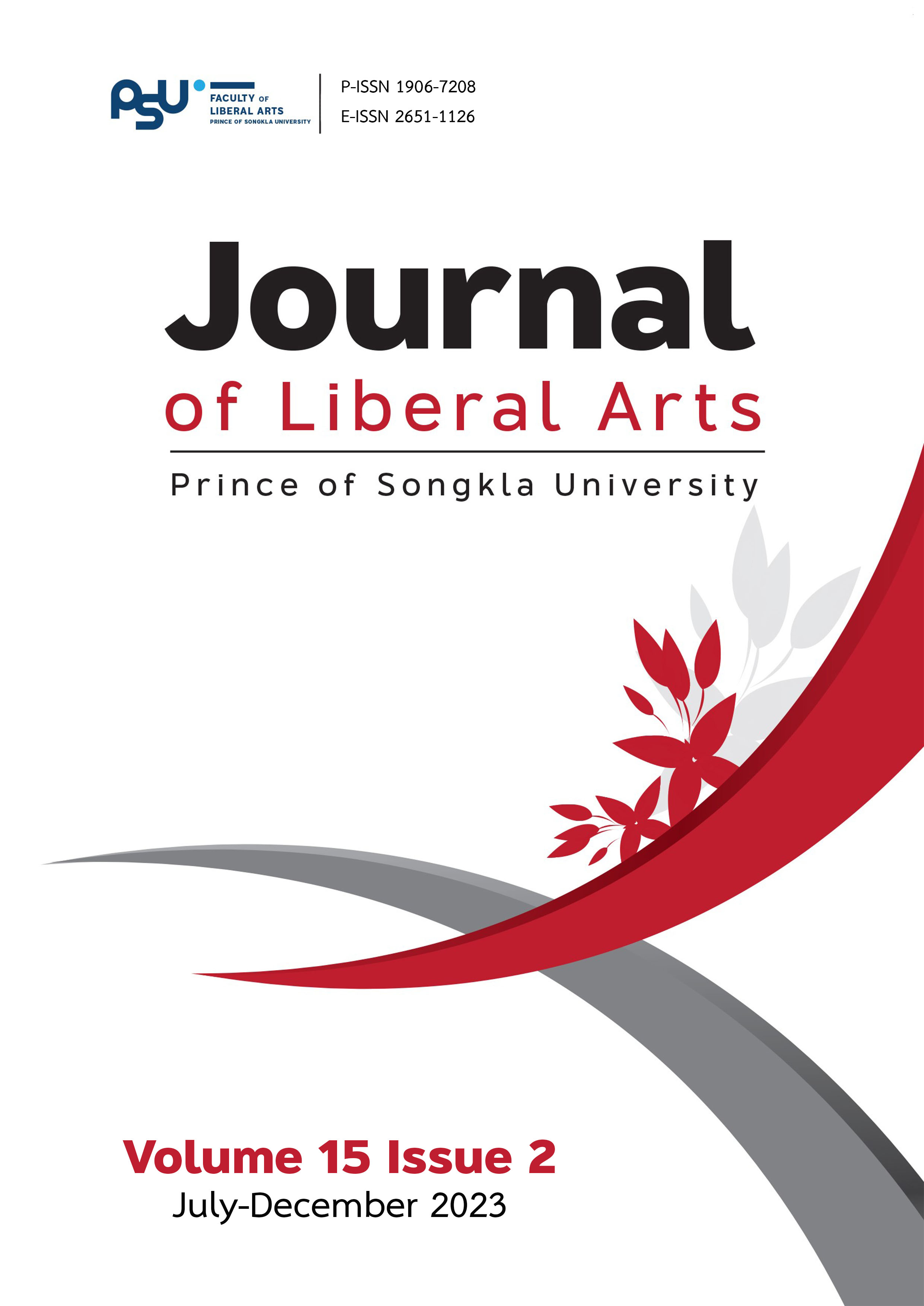Situation and Professional Development Needs of Foreign Teachers in Thailand
DOI:
https://doi.org/10.14456/jlapsu.2023.18Keywords:
Foreign Teachers, Professional Development Needs, English Language InstructionAbstract
The objectives of this research are to 1) investigate the situation of foreign teachers in Thai educational settings; 2) survey their needs for professional development; and 3) propose solutions to overcome the obstacles they faced based on the collected data. The subjects of this study were 13 foreign teachers in a demonstration school in the central region of Thailand. The research tool utilized for the purpose of this study was a semi-structured interview where foreign teachers were asked to reflect on their teaching performance and investigate their needs for professional development. The demographic information, answers from the checklist and the survey were presented in a descriptive analysis. A content analysis was applied to identify and interpret the data gained from the interview, with conclusions drawn from a directed content analysis of the situation and needs of professional development. The findings revealed that their performance in the classroom was effective despite administrative policies of the school, language barriers and the issue of cultural differences posing major challenges to them. The areas that should be included in the professional development program are those that had impacts on their performance in the classroom such as instructional design, classroom management, and contents in the main subject. In order to make the professional development program effective and engaging for the foreign teachers, their opinions should be considered. They should be able to propose the topic or the activities related to their professional development that would correlate to their needs and interests.
References
Arasaratnam, L. A. (2016). Intercultural competence In Nussbaum J (ed), Oxford Research Encyclopaedia of Communication. Oxford University Press. https://doi.org/10.1093/acrefore/9780190228613.013.68
Baker, W., & Jarunthawatchai, W. (2017). English language policy in Thailand. European Journal of Language Policy, 9(1), 27-44. https://doi.org/10.3828/ejlp.2017.3
Bishop, P., Phusee-Orn, S., & Malasri, A. (2016). Development of evaluation indicators for foreign teachers teaching English subject in the basic education level of Thailand. Journal of Educational Measurement Mahasarakham University, 22(2), 247-261.
Chaiyasaeng, W., & Sudrung, J. (2019). Working conditions and problems encountered by foreign instructors in secondary schools administered by the Office of the Basic Education Commission (OBEC) in Bangkok. An Online Journal of Education, 14(2), 1-11.
Chitnelawong, S. (2009). A study of state and problems of the administration of bilingual private kindergartens under the Office of the Private Education Commission in metropolitan Bangkok [Unpublished master’s degree thesis]. Chulalongkorn University.
Chuchuen, R., Tubsree, C., & Suthithatip, S. (2017). Foreign teacher management system in an English program school: a case study at Piboonbumpen Demonstration School Burapha University, Thailand. HRD Journal, 8(2), 80-91.
Colbert, J. (2008). An investigation of the impacts of teacher-driven professional development pedagogy and student learning. Teacher Education Quarterly, 35(2), 135-154.
Deardorff, D. K. (2006). Identification and assessment of intercultural competence as a student outcome of internationalization. Journal of Studies in International Education, 10(3), 241–266. https://doi.org/10.1177/ 1028315306287002
Deardorff, D. K. (2020). Manual for developing intercultural competencies. Routledge.
Dhanasobhon, S. (2007). English language teaching dilemma in Thailand. Kasetsart Educational Review (Thailand), 22(1), 53-59.
Farrell, T. (2015). It's not who you are! It's how you teach! Critical competencies associated with effective teaching. RELC Journal, 46. https://doi.org/10.1177/ 00336882145|68096.
Jongjit, J. (2018). Co-Thai teachers’ opinions about cultural differences working with foreign teachers in private schools in Bangkok [Unpublished master’s degree thesis]. Thammasat University.
Klinkerd, W. (2015). Professional development of primary English teachers: needs and problems [Unpublished master’s degree thesis]. Thammasat University.
Laksanasut, S. (2020). Bilingual education in Thailand: background, implementation, limitation, and case study. OCE Journal, 17(3), 54-59.
Lyman, H. B. (1963). Test scores and what they mean. Prentice-Hall, Inc.
Ministry of Education. (2009). Guidelines for learning management based on the Basic Education Curriculum 2001. Thailand. MOE.
Ministry of Education. (2014). The Common European Framework of Reference for Language handbook. Bangkok: Office of the Basic Education Commission. MOE.
MOE360. (2020, March 9). Sortor harue nuay gnan dan tangprated triam chadha krutangchat tangpao roemsorn peekarnsuksa 2563 chamnuan 10,000 kon. (in Thai) [MOE discussing with foreign affairs organizations to recruit 10,000 foreign teachers for academic year 2020]. https://moe360.blog/2020/ 03/09/
Noom-ura, S. (2013). English-teaching problems in Thailand and Thai teachers’ professional development needs. English Language Teaching, 6(11), 139-147.
OECD. (2018). Teacher questionnaire. http://www.oecd.org/ education/school/
Pongsuthirak, J. (2015). Situation and problem of learning management based on the basic education curriculum of private schools in Nonthaburi and Pathumthani provinces [Unpublished master’s degree thesis]. Dhurakij Pundit University.
Reis, D. S. (2011). Non-native English-speaking teachers (NNESTs) and professional legitimacy: a sociocultural theoretical perspective on identity transformation. International Journal of the Sociology of Language, 208, 139-160.
Richards, J. C., & Farrell, C. (2005). Professional development for language teachers: strategies for teacher learning. Cambridge University Press.
Santimit, O., & Maput, C. (2010). Actual and experienced performance of foreign teachers as perceived by students and teachers under private schools in Bangkok. Journal of Education and Social Development, 6(1), 27-36.
Spitzberg, B. H., & Chagnon, G. (2011). Conceptualizing intercultural competence. In D. K. Deardorff (Ed.), The Sage handbook of intercultural competence (pp. 2 – 52). Thousand Oaks, CA: Sage.
Ulla, M. B. (2019). Filipinos as EFL teachers in Bangkok, Thailand: implications for language education policy in the ASEAN region. RELC Journal. https://doi.org/10. 1177/0033688219879775
Ulla, M. B., & Winitkun, D. (2018). In-service teacher training program in Thailand: Teachers’ beliefs, needs, and changes. Pertanika Journal of Social Sciences & Humanities, 26(3), 1579-1594.
Downloads
Published
How to Cite
Issue
Section
License
Copyright (c) 2023 Manita Srisitanont Luangkrajang

This work is licensed under a Creative Commons Attribution-NonCommercial-NoDerivatives 4.0 International License.
The authors retain the copyright to their article but the Journal of Liberal Arts, Prince of Songkla University reserves the exclusive rights to first publication.






